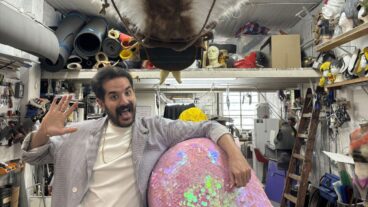When Noa Tishby moved from Tel Aviv to Los Angeles, it was to make it as an actress. Two years later, she’s now a history-making producer, spearheading the first original Israeli TV drama series to be picked up by an American network.
Last week, HBO ordered a full season of an American version of the hit Israeli show, In Treatment – “BeTipul” in Hebrew – a half-hour drama about a therapist and his patients. The US version stars Gabriel Byrne as a calm pillar of stability with his patients, who turns angry and insecure with his own therapist, played by Dianne Wiest.
Actor/producer Mark Wahlberg (HBO’s Entourage) serves as executive producer; writer/director Rodrigo Garcia (HBO’s Carnivale and Big Love) as executive produce and showrunner; and Tishby as co-executive producer. Completing the cast are Josh Charles, Embeth Davidtz, Mia Wasikowska, Melissa George and Blair Underwood.
While Israeli pop culture has been making increasing inroads into the United States – this year alone, filmmakers Gal Uchovsky and Eytan Fox will release their latest effort The Bubble in the US, and stateside tours are planned by musicians Ivri Lider, Idan Reichel and author Etgar Keret – the television industry has remained elusive. But in a business wrought with false promises and dead-ends, the speed and ease at which In Treatment made it to the US and Tishby went from actress to groundbreaker can only be described as charmed.
The journey began in November of 2005, when Tishby returned to Tel Aviv for her niece’s bat mitzvah and In Treatment was the talk of the town.
“It was the most brilliant concept for a TV show I’d heard in my life,” says an exuberant Tishby in a mastered American accent. “It was a nightly soap, with no flashbacks, background stories or guest stars. Everything happens in the therapy room, which creates an intense environment. It’s one of the most voyeuristic things I’d ever seen. Anyone who’s ever been to therapy – that’s the way it really is. I just knew it should be seen in America.”
Tishby, already a famous actress and singer in Israel, snagged the mobile number of the show’s creator, Haggai Levi, through her Israeli agent. “I’m calling about your show – but it’s not what you think it is,” she blurted, quickly allaying his concern she was pitching herself as an actress. (Levi, now working on the second season of the Israeli In Treatment, is also an executive producer on the HBO show.)
By sheer luck, Tishby had just signed with Leverage Management, the same firm that represents Mark Wahlberg and his HBO comedy, Entourage, a biting satire of fame and movie industry. Last summer, Leverage took a subtitled version to HBO, which ordered an initial five episodes, before green lighting another 40 last week.
“None of this could have happened without [Leverage founder] Stephen Levinson,” says Tishby. “He has such an incredible vision and championed it all the way. It is so amazing that he trusted me. I had just started working with him, so I wasn’t sure how all of this would go down. But it’s been like working with your friends. It’s really about the art and making great television, and that’s why the relationship is so powerful.”
Though production is expected to start in a couple of months, HBO has yet to set an airdate and decide whether to air the 45 episodes five nights a week for nine weeks, as they appeared on the Israeli digital cable channel, Hot. In that presentation, the therapist would counsel a different patient – one couple, a teenage girl, one woman, and one man – in subsequent episodes for the first four nights of the week. On the fifth, the psychiatrist would see his therapist, unveiling a very different side of himself.
While keeping mum on how the show has been tweaked for American viewers, Tishby allows that the storylines and emotions are similar. “People are people, no matter where they are. Their pain, anger, love and dilemmas are the same.”
Ironically, Tishby – who has appeared in the Dreamworks film The Island and U.S. tv shows like CSI: Miami, and Nip/Tuck – will not perform on the HBO series. But her newfound producer status and conduit to the Israeli creative community may help its TV industry become an incubator to larger markets.
“I think this particular program will show the world that Israel can be a provider of art, and not just be about technology and war,” she says.












